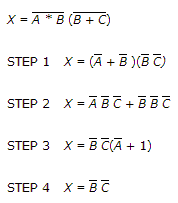Discussion
Home ‣ Digital Electronics ‣ Describing Logic Circuits Comments
- Question
Which step in this reduction process is using DeMorgan's theorem?

Options- A. STEP 1
- B. STEP 2
- C. STEP 3
- D. STEP 4
- Correct Answer
- STEP 1
- 1. Identify the type of gate below from the equation

Options- A. Ex-NOR gate
- B. OR gate
- C. Ex-OR gate
- D. NAND gate Discuss
- 2. Which type of gate can be used to add two bits?
Options- A. Ex-OR
- B. Ex-NOR
- C. Ex-NAND
- D. NOR Discuss
- 3. The Ex-NOR is sometimes called the ________.
Options- A. parity gate
- B. equality gate
- C. inverted OR
- D. parity gate or the equality gate Discuss
- 4. Select the statement that best describes the parity method of error detection:
Options- A. Parity checking is best suited for detecting double-bit errors that occur during the transmission of codes from one location to another.
- B. Parity checking is not suitable for detecting single-bit errors in transmitted codes.
- C. Parity checking is best suited for detecting single-bit errors in transmitted codes.
- D. Parity checking is capable of detecting and correcting errors in transmitted codes. Discuss
- 5. A logic circuit that provides a HIGH output if one input or the other input, but not both, is HIGH, is a(n):
Options- A. Ex-NOR gate
- B. OR gate
- C. Ex-OR gate
- D. NAND gate Discuss
- 6. Which of the figures given below represents an OR gate?

Options- A. a
- B. b
- C. c
- D. d Discuss
- 7. A NOR gate with one HIGH input and one LOW input:
Options- A. will output a HIGH
- B. functions as an AND
- C. will not function
- D. will output a LOW Discuss
- 8. What is the basic difference between AHDL and VHDL?
Options- A. ADHL is used in all PLD's.
- B. VHDL is used in all PLD's.
- C. ADHL is proprietary.
- D. VHDL is proprietary. Discuss
- 9. The Boolean equation for a NOR function is:
Options- A.

- B.

- C.

- D.
 Discuss
Discuss
- 10. How are the statements between BEGIN and END not evaluated in VHDL?
Options- A. Constantly
- B. Simultaneously
- C. Concurrently
- D. Sequentially Discuss
Describing Logic Circuits problems
Search Results
Correct Answer: Ex-OR gate
Correct Answer: Ex-OR
Correct Answer: equality gate
Correct Answer: Parity checking is best suited for detecting single-bit errors in transmitted codes.
Correct Answer: Ex-OR gate
Correct Answer: a
Correct Answer: will output a LOW
Correct Answer: ADHL is proprietary.
Correct Answer:

Correct Answer: Sequentially
Comments
There are no comments.More in Digital Electronics:
Programming
Copyright ©CuriousTab. All rights reserved.
